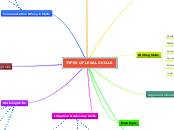Communication/covering letters
Advice to clients/other parties
Represents the firm/company/department
To the context of
the case at hand
General Transferable Skills
Autonomy and personal skills
Communication & People Skills
Litigation & Advocacy Skills
Identify the relevant facts
•Case name
•Year
•Law report
•Court level + judge(s)’ name
•Summary of facts + judgment
•Ratio decidendi + obiter dicta
Lawyer-client relationship
Get full facts of the case, identify the issues, advise accordingly
Communication with other parties(opponent, police witnesses)
Preparing for the interview
Know what information is required
Identify the relevant facts-ask open ended questions, snowball effects
Bear in mind the applicable laws + elements of law
Consider potential questions/remarks by opposing lawyer
Record all details, make sure to keep proper records
Research on the applicable laws + verify to confirm
Link with opinion writing + argumentation skills
E.g. returning calls/messages
promptly, punctuality,
quality of work
•Good listener =
commitment +
interest
•Maintain objectivity
= receptive of new
ideas
•Consultation
•Court appearance
•Deal with other
parties
•Be attentive
•Analyse based on
facts + elements of
law
•Separate the
relevant facts from
mere opinion
Look for expressions/emotions
•"Res ipsa loquitor"
•Reflect on the
context of that
person
•Listen more than
you speak
•Let the person use
their own
terminologies
•Do not offer advice
unless asked for it
1.Preparation
2.Do research
(legal and facts)
3.Communicate
with client
4.In the loop
with the court
1.Case
management
2.Triable?
Proceed to trial
3. Exam-in-chief
4.Cross-exam
5.Re-exam
-Trial-Satisfied? File
the court order
-Not satisfied?
Appeal @
Review
• Interconnectivity between the relevant facts + elements of law
• Keeps you motivated and on track all step of the way
• Legal assignments
• Case briefs
• Opinions to clients
• Pleading drafts
• Sequential / chronological
• Deductive reasoning vs inductive reasoning
•Title + year
•Author(s) is authoritative?
•Facts @ opinion?
•Cited by others?
•TLDs = .gov, .edu, .com, .biz
•Land search, company search, OA search, etc.
